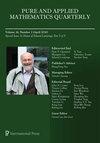$H^{\frac{11}{4}}(\mathbb{R}^2)$二维弹性波系统的假定性
IF 0.8
4区 数学
Q3 MATHEMATICS
引用次数: 0
摘要
在本文中,我们证明了对于二维弹性波方程这一具有多重波速的物理系统,其考奇问题无法在 $H \frac{11}{4} 中局部良好求解。(\mathbb R^2)$.这里的拟合不良是由瞬时冲击形成驱动的。史密斯-塔图鲁(Smith-Tataru)在二维研究中发现,单个准线性波方程的考奇问题在 $H ^s$ 中局部良好求和,$s \gt \frac{11}{4}$。因此,我们在此得到的 $H ^\frac{11}{4}$ 不合常理是一个理想的结果。我们的证明依赖于几何方法和代数波分解方法的结合,以及对相应双曲系统的详细分析。本文章由计算机程序翻译,如有差异,请以英文原文为准。
$H^{\frac{11}{4}}(\mathbb{R}^2)$ Ill-Posedness for 2D Elastic Wave System
In this paper, we prove that for the 2D elastic wave equations, a physical system with multiple wave-speeds, its Cauchy problem fails to be locally well-posed in $H \frac{11}{4} (\mathbb R^2)$. The ill-posedness here is driven by instantaneous shock formation. In 2D Smith-Tataru showed that the Cauchy problem for a single quasilinear wave equation is locally well-posed in $H^s$ with $s \gt \frac{11}{4}$. Hence our $H ^\frac{11}{4}$ ill-posedness obtained here is a desired result. Our proof relies on combining a geometric method and an algebraic wave-decomposition approach, together with detailed analysis of the corresponding hyperbolic system.
求助全文
通过发布文献求助,成功后即可免费获取论文全文。
去求助
来源期刊
CiteScore
0.90
自引率
0.00%
发文量
30
审稿时长
>12 weeks
期刊介绍:
Publishes high-quality, original papers on all fields of mathematics. To facilitate fruitful interchanges between mathematicians from different regions and specialties, and to effectively disseminate new breakthroughs in mathematics, the journal welcomes well-written submissions from all significant areas of mathematics. The editors are committed to promoting the highest quality of mathematical scholarship.

 求助内容:
求助内容: 应助结果提醒方式:
应助结果提醒方式:


